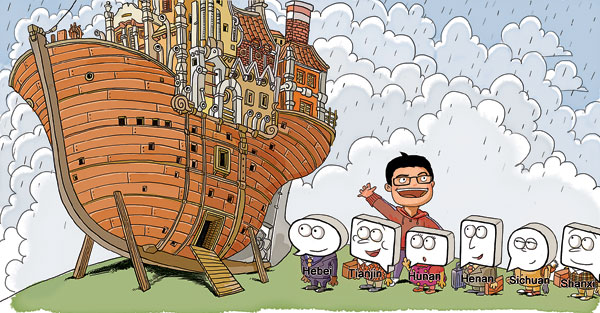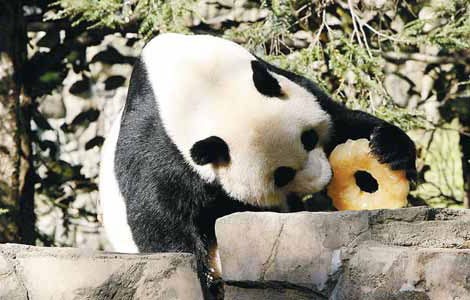Digital dialects
Updated: 2013-12-08 07:30
By Sun Ye (China Daily)
|
|||||||||||
 |
| [Illustration by Song Chen/China Daily] |
New media such as smartphone apps are preserving China's local vernaculars, which are otherwise declining among the younger, tech-savvy generation. Sun Ye reports.
Computer codes are deciphering a lifeline for China's dying dialects.
The digitalization of dialects via smartphone apps and other new media is reconnecting the tech-savvy younger generation with the ancient vernaculars they're being slowly pulled away from by modernization, urbanization and globalization.
The low-budget IOS and Android game Crazy Dialects, for instance, has 10 million players.
Users listen to a phrase spoken in one of the country's incalculable dialects and define - usually, guess - their meanings by multiple choice.
They start with Beijing dialect, which is a slightly slurred tweak on Putonghua, the standardized version of Mandarin. They then advance to the somewhat less standard Hebei and Tianjin dialects. From there, they move on to other increasingly distant-from-Putonghua parlances from 20 other provinces.
They don't have the database for the entire nation. Creating it would be an unprecedented task.
Only the most successful gamers can rise to the newly added Zhejiang dialect level, which is at least as difficult to beat as it is to reach.
China's dialects are generally dichotomized as Mandarin-based and non-Mandarin based. Putonghua is, in fact, an auxiliary Mandarin-based dialect that's nobody's mother tongue. Rather, it is a standardization of Mandarin dialects developed from a family of similar parlances from eight linguistic regions, including Beijing, Northeast China, Jianghuai and Southwest China.
It was declared the sole official language in 1955 to enable the entire nation to better understand one another. Other dialects, such as Hakka and Cantonese, don't share the rules of Mandarin or the family that sired it.
While there are broad branches of China's linguistic tree, every city, county, town and village sprouts progressively idiosyncratic offshoots. So, the nation's dialects are as numerous as leaves and provide plenty of data for such apps as Crazy Dialects.
"We had so much fun designing it," developer Zhu Weibo says.
"We laughed often when we heard the strange expressions. It was fun, even though we worked through the nights."
The 34-year-old came up with the idea and toiled with four colleagues for three weeks to develop the game.
"I discovered how much fun a different dialect could bring," he says.
"I was confident we'd get many users and wanted to display the diversity of dialects."
The developers grabbed sound bites by asking friends from across the country to find native speakers in their respective locales.
Related Stories
Finding ways to preserve the Fuzhou dialect 2013-08-01 14:14
Dialects are the spice of life 2013-07-19 09:13
Recording diversity of dialects gives window into China's soul 2013-07-15 07:11
New novel sparks interest in dialect literature 2013-06-12 08:01
Today's Top News
Cameron answers questions on Weibo
Top legislature rejects JP resolution
Haze chokes China's east, north
S. African politics not affected
China film festival opens in London
Nations to jointly tap nuclear markets
Xi leads China's tributes to Mandela
Smog gives expats second thoughts
Hot Topics
Lunar probe , China growth forecasts, Emission rules get tougher, China seen through 'colored lens', International board,
Editor's Picks

|

|

|

|

|

|





